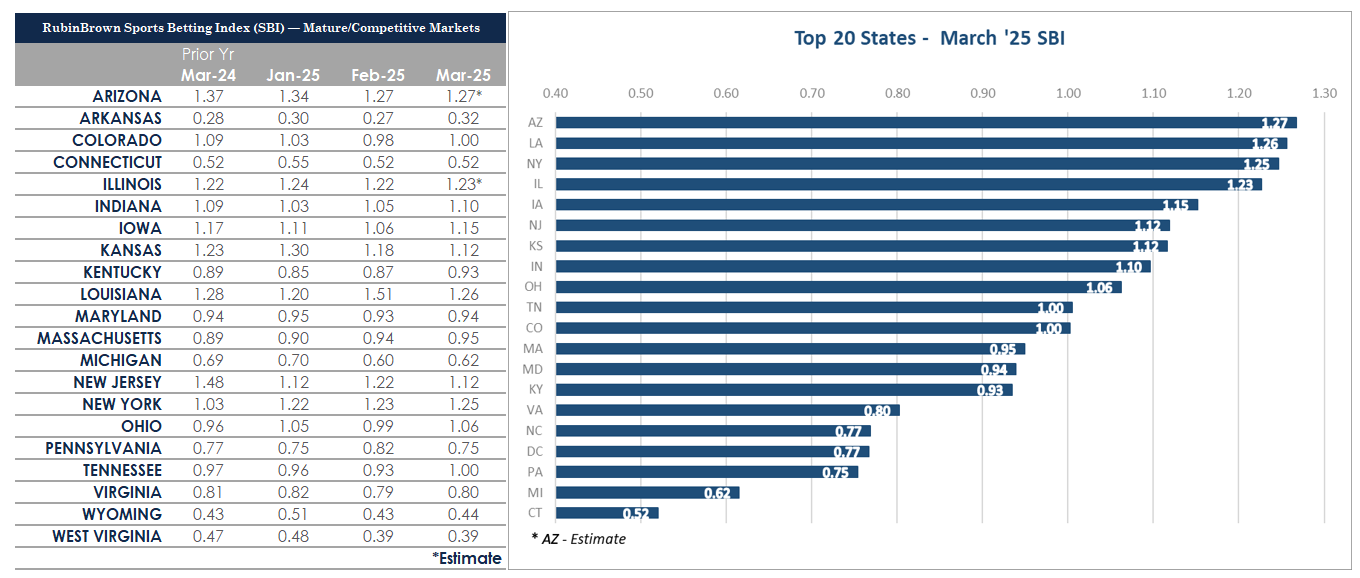RubinBrown Sports Betting Index: March 2025 Analysis
RubinBrown Sports Betting Index: March 2025 Analysis
March Sports Betting Index (SBI)
In the chart below, we present our RubinBrown Sports Betting Index (SBI). The SBI is based on our proprietary index of the leading sports betting states in the U.S. To continue to best reflect current market conditions, we’ll occasionally adjust the components of the index. To better compare competitive conditions, our index numbers focus in on a group of mature, competitive states. Therefore, a state with an index score of 1.15 had a raw index score of 15% greater than the average, while a 0.90 index score shows a 10% lower than average result.
LEARN MORE ABOUT THE RUBINBROWN SBI
U.S. Sports Betting Trends and Responsible Gaming Efforts – March 2025
March 2025 was a strong month for sports betting activity in the U.S., with total handle rising across most states compared to February, as we saw the expected impact of March Madness. However, while more wagers were placed, sportsbook profits didn’t keep pace. That’s largely because hold percentages fell, with many key markets dropping well below our 10% benchmark.
Many sportsbook patrons enjoyed March Madness and cashed in as favorites won at a high clip and there were far fewer upsets than normal. With all four No. 1 seeds making it to the Final Four, public bettors who tend to back top teams and moneyline favorites were rewarded, pushing payout totals higher and cutting into gaming revenues for operators.
While sportsbooks face a challenge managing risk during high-profile events that draw large numbers of casual bettors often betting on the same outcomes, we note that even with very patron-favorable results, hold rate remained higher than the 4-5% sportsbooks in Nevada expected before PASPA was repealed. We believe most operators are pleased to have gained new customers from the high-profile event and have higher confidence in their risk management strategies to have still profited despite adverse outcomes.
March and the Spotlight on Responsible Gaming
March also marked Problem Gambling Awareness Month, and the industry took the opportunity to showcase its commitment to safer play. The timing was especially important, as March Madness drew record levels of engagement.
DraftKings expanded its support for state councils, distributing over $500,000 to responsible gaming efforts in 34 states, even in regions where it doesn’t currently operate. It also promoted its "My Stat Sheet" tool, launched a year ago, which gives players visibility into their gambling activity. The company paired these efforts with a $10 million national advertising campaign focused on setting limits and making smart choices.
FanDuel launched a new content initiative, “The Comeback with Craig Carton,” aimed at shedding light on gambling addiction and promoting recovery resources. The show is part of a wider push to reduce stigma and encourage those struggling with gambling problems to seek help.
Regulators were active, too. In Michigan, the state gaming board used its “Double Down Michigan” podcast to spotlight prevention strategies. Illinois partnered with health agencies to raise awareness about warning signs and available resources. Massachusetts, meanwhile, held in-person outreach events, including Gambling Disorder Screening Day.
These actions reflect a growing awareness among both operators and regulators that player protection must grow alongside industry revenue.
Looking Across the Atlantic
Meanwhile, in the UK, a recent report from GAMSTOP revealed that over 530,000 people — roughly 1% of the adult population — have signed up for its national self-exclusion service since 2018. Of particular concern is the sharp rise in sign-ups among 16- to 24-year-olds, who accounted for nearly a quarter of all new registrations in the second half of 2024. That’s a 31% increase from the same period a year earlier, a jump likely tied to high-profile events like the Olympics and Euro 2024.
While the 1% figure may involve some rounding, it still points to a meaningful trend. It also serves as a warning sign for U.S. markets, which haven’t yet adopted widespread self-exclusion tools at a national level.
The UK’s experience underscores the importance of making responsible gaming resources more visible and accessible, particularly for younger bettors who may be more vulnerable to developing problematic habits.
Contact us to learn more about our Gaming Tax practice and other specialty advisory practices within our dedicated Gaming team at RubinBrown.
.png)
Published: 05/14/2025
Readers should not act upon information presented without individual professional consultation.
Any federal tax advice contained in this communication (including any attachments): (i) is intended for your use only, (ii) is based on the accuracy and completeness of the facts you have provided us, and (iii) may not be relied upon to avoid penalties.
.png)